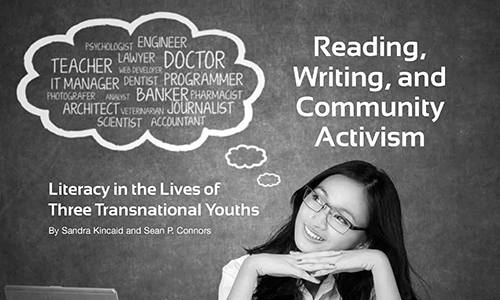Honors College Research Examines How Language Shapes Identity
Sandra Kincaid is not an English teacher yet, but the research she conducted for her Honors College thesis at the University of Arkansas convinced her that students need reading and writing assignments based on content that is relevant to their lives.
Kincaid graduated cum laude last spring with a bachelor's degree in English literature and is spending this year working as a teacher's assistant in Spain. She is planning to enter the Master of Arts in Teaching program at the U of A this summer after her return.
Kincaid had no experience with immigrants and had never heard the term transnational until shortly before she undertook the research project. She described the study in an article she and her professor, Sean Connors, wrote for English in Texas, a peer-reviewed journal of the Texas Council of Teachers of English Language Arts. Connors is an associate professor of English education in the College of Education and Health Professions.
Kincaid grew up in Lenexa, Kansas, which is part of the Kansas City metropolitan area. The idea for her thesis grew from a class project that Connors assigned for his Literacy in America course. He asked students to conduct an interview as part of an oral history project examining the literacy experiences of residents of the Arkansas Ozarks.
She interviewed "Sofia," a 26-year-old woman whose family came from Mexico. Sofia attended college and participated in several activities that involved using literacy to better the lives of people in the local Latino community. Sofia campaigned for United We Dream, a national advocacy group that seeks to promote equal access to education for immigrant youth. She also tutored other English language learners and helped Latino immigrants navigate bureaucratic channels involved in obtaining work permits and other forms of documentation.
"For Sofia, reading and writing were tools she used to enhance the quality of her life and the lives of other Latino immigrants," according to the article.
For her honors thesis, Kincaid expanded the project to interview five more participants who could be described as transnational because of their connections with two or more nations. She looked at how people construct and maintain their identity in part through their use of language. The qualitative research got to the root of how the six Latinos used literacy to "enact, defend and transform their identities as transnational youth in response to evolving social and political conditions they encountered in the United States."
Kincaid met the other participants in her study by attending a meeting of Arkansas Natural Dreamers, a local affiliate of United We Dream. It turned out to be a good place to meet potential participants because of their common interest in political issues regarding immigration. They needed to read extensively to keep informed, and they needed to write well to spread information and help others, she said.
"After I introduced myself and explained why I was there, I said I was impressed by how informed everyone was and how much they understand about what was going on," Kincaid said. "A lot of my friends are not as well-informed. One girl told me they have to be. As undocumented immigrants, they have to pay attention to what's going on in the world because it directly affects them."
The people at the meeting understood, also, that they have to respond in an articulate manner, both in speaking and writing, when talking to others about these issues, Kincaid said.
The article in the journal for English teachers focused on how teachers could use their students' backgrounds and interests to improve their literacy skills.
"While our small sample size prohibits broader generalizations, our study does suggest that when teachers demonstrate a willingness to learn about the people and institutions that sponsor their students' literacy, create opportunities for students to use literacy for authentic purposes, and support their understanding reading and writing as tools they can use to address problems that face their respective communities, they may increase their students' motivation to participate in meaningful literacy learning," Kincaid wrote with Connors in the article.
And, this means that teachers must set aside time early in the school year to get to know their students and what people and sources influenced their literacy.
"Students are more likely to develop as readers and writers when they are given cause to use their literacy to address real-world issues and problems," according to the article.
Kincaid's work in Spain is part of a national initiative to improve English language skills among high school graduates. She arranged for "Emilio," another one of the study participants, to have a conversation by Skype with her students. They asked him questions about how U.S. residents from Latin America feel about the recent U.S. presidential election. Emilio writes about social injustice and cultivated relationships with local media, serving as a source for stories and comment.
"I wanted to emphasize to them the importance of being able to speak multiple languages, Kincaid said. "Emilio is a really good example of using both English and Spanish to reach a broader audience and exercise your opinion."
Contacts
Heidi S. Wells, director of communications
College of Education and Health Professions
479-575-3138, heidisw@uark.edu
